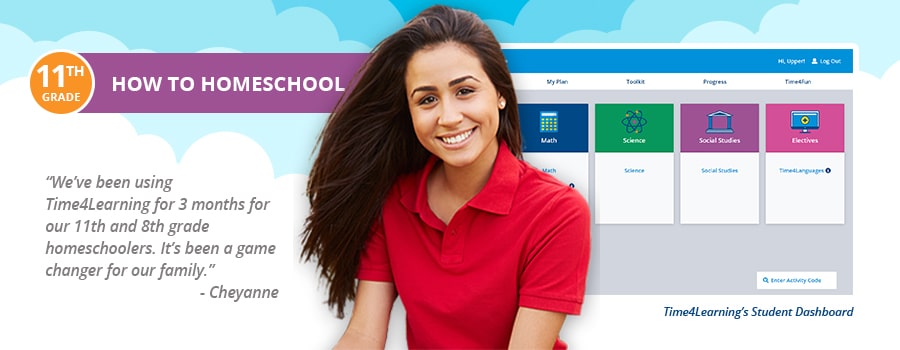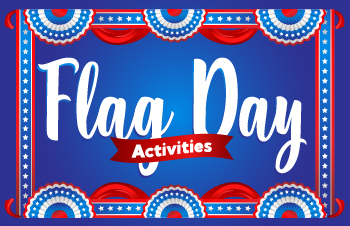How to Homeschool Eleventh Grade
Get your child ready for high school graduation with Time4Learning’s 11th grade homeschool curriculum. As you and your child navigate through the different paths available after graduation, we want to be the helping hand that helps you both get there.
The learning opportunities that homeschooling 11th grade provides are endless. Here’s some information we’ve compiled to help you discover how to homeschool 11th grade effectively and without stress:
- How to Homeschool Eleventh Grade
- What Schedule is Best for an Eleventh Grader
- What Subjects are Taught in Eleventh Grade
- Eleventh Grade Learning Objectives
- Reading Book List for Eleventh Grade
- Eleventh Grade Homeschooling Tips & Ideas
- How Time4Learning Can Help You Homeschool Your Eleventh Grader
- Additional Eleventh Grade Homeschooling Resources
How to Homeschool Eleventh Grade
Before you start homeschooling 11th grade, you will want to do a few things:
- Make sure you know your state’s homeschooling requirements
- Identify an engaging core curriculum that fits your child’s strengths and needs.
- Choose electives that will benefit your child and meet any requirements of your state.
- Find a place in your home where your 11th grader can work.
- Create goals for the year and choose a method of recordkeeping.
- Determine a schedule for completion of the required hours and content (again, check your state’s requirements).
- Consider how you will assess your child’s progress.
- Find out the information you need if your child will be taking college or military admissions tests.
Not sure how to plan out the 11th grade homeschooling year? Check out our 11th grade scope and sequence page.
What Schedule is Best for an Eleventh Grader?
While most states do not require a certain number of hours of instruction per day or per year, some states do, so be sure to check your state requirements. New homeschoolers can be surprised by just how much flexibility they now have! That said, most 11th grade homeschoolers average about 5 hours a day.
Here are a few things to consider when setting up a schedule for your 11th grader:
- Teenagers need more sleep than they know, and their internal clocks may cause them difficulties going to sleep. They may not be good at getting up early (i.e., like a traditional high school student). The wonderful news is that you can adjust your day to NOT begin at the crack of dawn.
- The school day also does not need to finish when a typical school day does, nor does it need to be one long period of time. Think about chunking the day to provide breaks to rest the mind, get exercise, or be social.
- Instruction doesn’t have to occur only on weekdays either. High school content can be challenging. Spreading the content out may make learning more effective and less stressful.
- Even the school year doesn’t have to follow traditional school timelines. You can stretch instruction through the summer with shorter “vacations” throughout the year. Just make sure you check assessment dates, if your state requires them or if your child is planning on taking admissions tests for college or the military.
For your 11th grader, consider more flexible schedules that can provide shorter learning periods, reduce anxiety, and maximize your child’s most productive times of the day!
Homeschooling Planner
Start planning out your homeschooling days with this free easy to use daily planner.
What Subjects Are Taught in Eleventh Grade
A typical course of study for eleventh grade homeschoolers includes:
- Language Arts
- Social Studies
- Science
- Math
- Health and safety
- Physical fitness program
- Electives like art, personal finance, and psychology
You should look up your state’s rules and find out if they have any required subjects for homeschoolers in 11th grade. Also, homeschooling is flexible, so take advantage of any number of electives to enrich your child’s education.
Eleventh Grade Learning Objectives
Your 11th grade student will learn to read, write, listen, and speak effectively to address complex topics and texts. He or she will develop critical thinking skills and be able to apply learning to real-world scenarios, analyze texts and problems, synthesize information from multiple sources, and evaluate ideas.
Specifically, the learning objectives for 11th graders will include the following:
- Apply prior knowledge to generate ideas about a nonfiction text.
- Analyze how the structure of a text contributes to its purpose.
- Synthesize and contrast the arguments of two texts.
- Evaluate information from different sources and media.
- Apply the remainder theorem.
- Analyze polynomial expressions to factor them completely.
- Model and solve mathematical and real-world problems using radical equations and determine extraneous roots.
- Evaluate numeric expressions using laws of integer exponents.
- Analyze the reasons for the rise of nativism in response to immigration.
- Assess the impact of the transcontinental railroad on transportation, settlement, and the frontier.
- Apply the scientific method to concepts in physics or chemistry.
Reading Book List for Eleventh Grade
In 11th grade, students are expected to read challenging nonfiction texts that inform subject areas like science and social studies. They also must be able to read and understand a variety of literature, including stories, poems, and plays across time periods and cultures.
Here are some texts recommended for 11th graders:
- Beowulf by an anonymous poet
- The Tragedy of Hamlet by William Shakespeare
- The Strange Case of Dr. Jekyll and Mr. Hyde by Robert Louis Stevenson
- The Importance of Being Ernest by Oscar Wilde
- The Fellowship of the Ring by J.R.R. Tolkien
Eleventh grade students should be reading a range of fiction and nonfiction texts. Continue to add books and other readings that are increasingly complex and expand vocabulary. Time4Learning’s eleventh grade homeschool curriculum for language arts also provides access to excerpts from various texts in order to broaden the reading list.
Eleventh Grade Homeschooling Tips & Ideas
As you begin to homeschool your 11th grader, there are certain things you may want to keep in mind. Here is a list of tips and ideas to help you and your child find success in 11th grade homeschooling:
- Design your homeschooling around what you know about your child: Plan your homeschooling days based on your child’s strengths, the way he or she learns, and best times of day for your child to be productive. Create opportunities for your child to build confidence and show you how far he or she has progressed.
- Remember that 11th grade can be stressful: 11th grade is a time when your child is beginning the move toward life after school. He or she may be focused on going to college or to the military or to a career. Your child may be juggling academics, work, activities, and a social life while trying to determine a future. Be patient and supportive whenever you can.
- Inform yourself about college entrance exams and requirements: Help your child navigate the college process if that is the direction he or she chooses. Provide guidance on the creation of a homeschooling portfolio. Find out about deadlines, admissions tests, college essays and applications, and financial aid. Visit colleges and assist your child in making the best decision possible of where to go.
- Monitor your child’s strategies: Make sure that your child will be ready for next steps after high school by checking that he or she has developed strategies for such things as organization, time management, notetaking, studying, and test taking.
- Check your child’s skills: Ensure that your child will be successful in college, the military, a vocational school, or employment. If there are gaps in reading or writing skills, math skills, or research/technology skills, address them right away.
- Provide choices: Teenagers are in constant search of opportunities to assert their independence. Give them choices and chances to make decisions.
- Remember to make learning engaging: Just because your child is in 11th grade doesn’t mean that he or she wants or needs to be bored. Take time to learn through play or field trips or whatever else may make learning more fun. Enjoy this time with your 11th grader while learning happens!
How Time4Learning Can Help You Homeschool Your Eleventh Grader
Whether you are just starting to homeschool in 11th grade or you are a veteran homeschooler, Time4Learning is an ideal choice for curriculum. While students enjoy interactive, engaging lessons, parents can enjoy an easy-to-use curriculum and resources that help make homeschooling stress-free.
Time4Learning is an ideal choice for homeschooling 11th grade because it offers these benefits:
- A flexible 11th grade homeschool curriculum that allows for choice in subject areas like math, science and social studies, as well as electives.
- A full year’s scope and sequence for each course subject area.
- Student-paced, interactive activities to keep learning engaging.
- Extra practice and extension activities to target certain skills.
- Opportunities to repeat lessons and retake quizzes and tests to achieve mastery.
- A total online package so that learning can occur wherever there is access to the Internet and whenever learning can happen (24 hours a day, 7 days a week).
- Parent access to planning, grading and recordkeeping systems.
- Parent forums where homeschoolers can support and learn from each other.
- Optional access to additional curriculum materials like foreign language curriculum.
- A Student Note-taking Guide is available for download, to support lesson adherence and test preparation.
- Tools for revising and scoring essays are included in the instructional sequences. These tools include checklists for revision suggestions, and rubrics for scoring.
- Be sure to check out the Time4Learning Facebook Families group to connect with other parents on the homeschooling journey!
Additional Eleventh Grade Homeschool Resources
Return to the 11th Grade Curriculum Overview. Or explore the our other eleventh grade resources:






